SIM Campers Experience “Ah-ha! Moments” Over the Beauty, Complexity, Oft-Misunderstood Nature...and Fun...of Mathematics
June 14, 2019
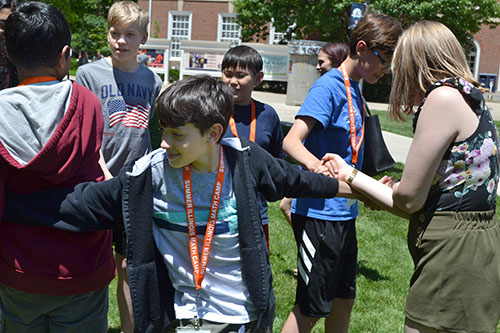
SIM camp students participating in a human knot activity.
“What is the point of this?!” a middle school student asked several of the 22 Summer Illinois Math (SIM) Camp Epsilon participants during an activity on the first day of the week-long day camp which ran from June 10–14th. Tied into a “human knot,” he and several of his fellow campers were trying to get untangled. Here’s how they got in this predicament: they stood in a circle facing each other; each raised their right hand and took the hand of someone across from them, then took another’s hand with their free hand. The goal? To untangle the knot without letting go of each other’s hands, deciding which players should go over, under, backwards, or forwards until they all ended up in a single circle, still holding hands.
The point of the Human Knot activity, according to Jenna Zomback, SIM camp director, in addition to being a fun ice breaker, was to foster teamwork:
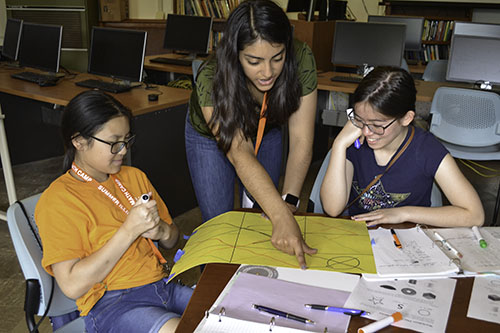
Elizabeth Ayala (center) demonstrates to students how to play tic-tac-toe on a 2D representation of a cylinder.
“We're trying to emphasize group work and communication,” she explains, indicating that the activity hadn’t necessarily been included to teach the kids any mathematical concepts. “We just want them to be able to work together to solve problems.” In fact, most of activities throughout the week involved participants solving problems in a group or with a partner.
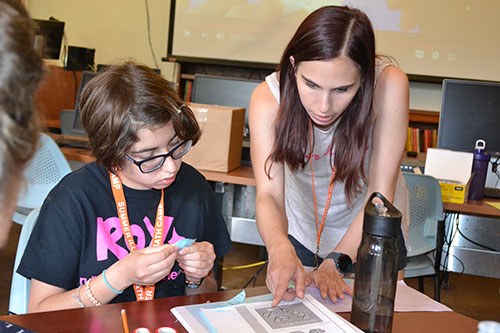
Jenna Zomback helps a camper with her Hexaflexagon.
Discovering that group work is important in math was just one of the many goals Zomback and her fellow math graduate students hoped young participants would take away from Camp Epsilon, the SIM camp for rising 8th and 9th graders. Some of Camp Epsilon’s morning activities, taught by Fernando Roman and Elizabeth Ayala, involved exploring shapes, such as the torus, cylinder, sphere, mobius strip, and Klein bottle, and playing games, such as Connect Four, tic-tac-toe, hide and seek, Battleship, or checkers on these various shapes.
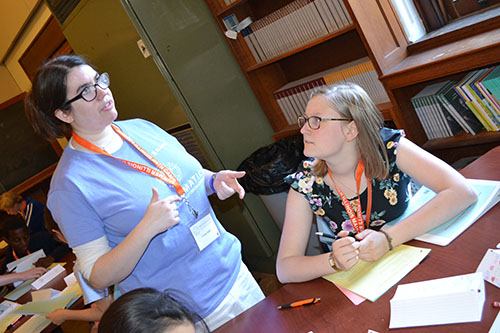
Grace Gaffe explains about a coding activity to a SIM camper.
In the afternoons, Grace Jaffe and Jack Gentile taught students about cryptography and making or deciphering codes. For instance, during one activity the kids received boxes filled with prizes, but locked with a three digit combination lock. They were told the code contained the numbers 0, 1, and 2. Kids had to determine how many possible combinations there were (27), try them, then unlock the box to retrieve its contents.
Other fun activities, besides untangling the Human Knot, included making a Hexaflexagon, and even playing Frisbee or cards during breaks.
SIM Camp Delta from June 17-21, 2019, will host 27 rising 9th through 12th grade students, who will get to explore number theory and cryptology in the morning, and “When a Straight Line Curves: The Geometries of Space” in the afternoon.
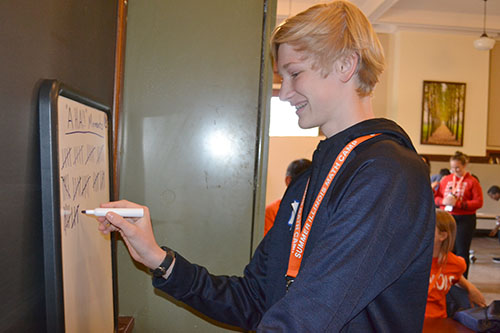
SIM camper Nicholas Bodony adds his recent Ah-ha! Moment to the count.
One important component of SIM camp is celebrating what they call “Aha Moments”—when students grasp a new concept about mathematics. They even have a chart, where students are encouraged to tally up those moments each time they have one! And for Alexi Block Gorman, Assistant Director of SIM, ensuring that the kids have these Aha Moments might be even more important than just learning the math.
“So for these kids, being able to articulate their Aha Moments to sort of identify what makes things click for them and understand better, not just what they're learning, but how they're learning it,” she expresses, regarding what she hopes the kids take away from the camp. “And too, it would definitely be wonderful for them to realize how diverse math is and how beautiful and complex and often misunderstood mathematics is.” So they want students to learn the math itself, but they also want them to learn how much they already know and are able to contribute to any project that they're working on. “So really our main goal is to inspire confidence and to help them learn to embrace new ideas,” she adds.
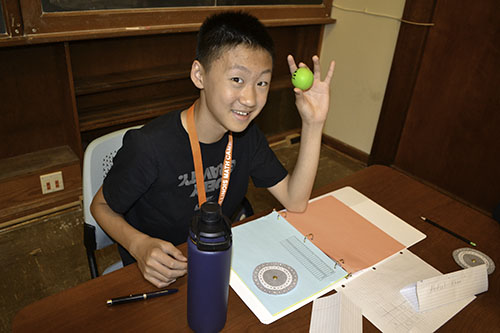
A SIM camper shows off the prize he chose once his team figured out the combination to unlock their box.
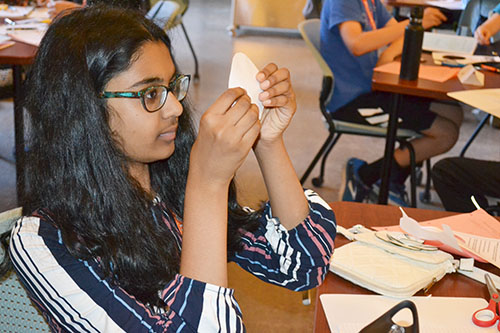 A SIM camper uses a Caesar Cipher Wheel to decode a quote from Lord of the Rings.
A SIM camper uses a Caesar Cipher Wheel to decode a quote from Lord of the Rings.SIM team members are especially excited about how accessible their camps are to local youngsters: “We really want this to be accessible for everyone,” Zomback explains. “I think it's great that all these local students can do this program, and see this math, and be part of this experience.”
Adds Block Gorman: “We always make a huge push to make SIM camp as accessible as possible to as much of the community as we can reach.” A not-for-profit, SIM isn’t funded by one specific source, but funding is amalgamated from many different sources, including donations from the general public on the SIM website. This allows the camp to be offered for a low price as one-week day camps go—$200 per student—with scholarships available to lower income students. Plus, they’re able to reimburse students for the cost of daily travel to camp and provide them with lunch each day.
This allows students from all different backgrounds to participate, which SIM grad students find rewarding. For example, Block Gorman appreciates “getting to know these kids and reading their applications and hearing about why they love math.” Plus, she finds it inspiring that SIM camp offers local young people across all different backgrounds “an opportunity to engage with something really abstract and beautiful…And that's really sort of the mission of SIM camp—to reach people who wouldn't be able to have access to this type of educational opportunity otherwise.”
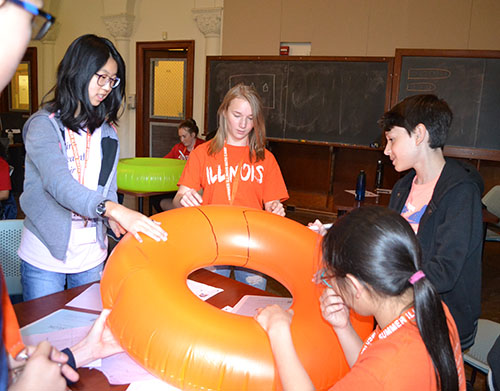
SIM camp students particpate in an activity with a torus where they must connect three houses to utilities (gas, power, and water)...without crossing any of those lines.
Zomback, a rising third year grad student studying descriptive set theory, explains why she and her cohorts committed to SIM. “Many of us didn't know that math beyond calculus existed until we got to college,” she admits. “And that's kind of a shame, because I think high school and middle school is when a lot of people get steered away from math. They think it's boring or they think they can't do it or that it's too hard.”
So their goal is to introduce the younger students to other types of math that they won’t necessarily see in middle and high school until more advanced math classes in college. Their main goal is, “so that they can see that math is fun. Math is supposed to be challenging, hard, and creative!”
Plus Zomback hopes to increase the diversity in the field. “We really want to encourage more people, especially women and minorities, to pursue math past high school.”
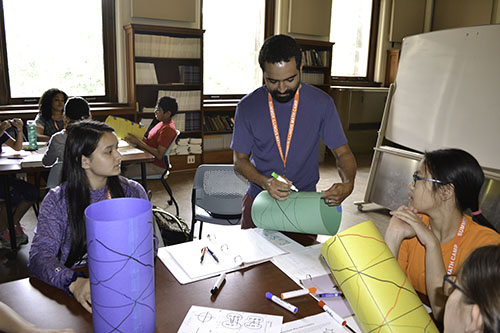
Fernando Roman Garcia (center) illustrates for students how to play tic-tac-toe on a cylinder.
Teaching Camp Epsilon’s morning session on Topology was Fernando Roman Garcia, a rising fifth year PhD student who studies Geometric Analysis. He got involved with SIM because he loves teaching math in fun new ways. “A lot of the time, mathematics is taught in a very dry and boring way,” he admits. “And I think there's a great opportunity to teach it to kids in a way that is fun that they see that it's not all just equations and numbers. There's geometry to it; there's real-world applications; there are fun games that they can play with it as well. It's more of an exploratory way of teaching it, and I think this camp is a great opportunity to put that into practice.”
Another reason math grad students participate in SIM is so they can give participants the kinds of experiences they had as youngsters that steered them into mathematics. For example, Block Gorman, a rising fourth year PhD student studying mathematical logic, indicates that that’s why she finds outreach to be incredibly rewarding.
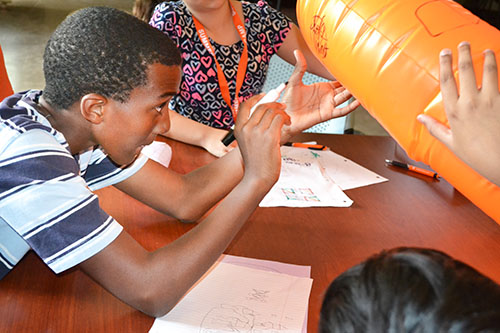
A SIM camper does an activity where he must connect three houses to utilities (gas, power, and water) on a torus...without crossing lines.
“I think back to the moments of excitement that I had when I was a child realizing that the world is more beautiful and more complex than I thought. Here, we give a name to that. We call them “Aha Moments” at SIM camp. And, when I think about how much it encouraged my learning and my interaction with the world and path to mathematics, it just makes me feel like this is the most rewarding thing that we can give back to the community.”
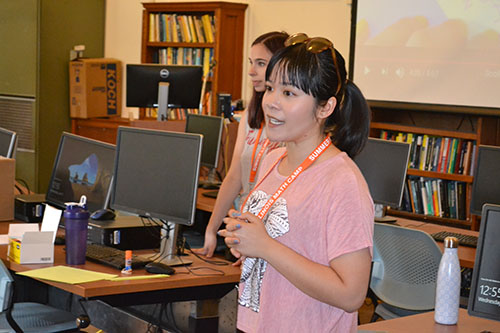
Chi Huynh gives SIM campers instructions about the next activity.
Helping out logistically with the camps was Chi Huynh, the SIM camp program coordinator, who wanted to be involved “to get to know what it takes to organize this camp.” While she didn’t actually teach any SIM camp courses, anytime that the students had breaks or outside activities, she was involved in that.
Huynh echoed Zomback’s reasons for why it’s a good idea to bring younger kids onto campus via SIM. She explains that often, middle and high schoolers only ever see calculus. “We want to show them that there is more to math than calculus, and there are also games that have mathematical ideas in them that you can play. And it can be fun and creative to play them, even though the ideas or the concepts of math they're doing in these games and activities are not something that they've seen before, but it's not something that they can't understand and practice with a little bit of help from instructors.”
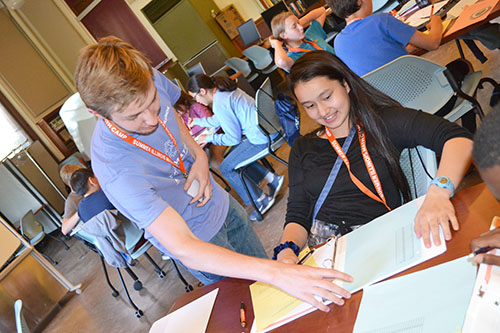
Jack Gentile works with Lisa Spencer on a coding activity.
While the campers signed up for a variety of reasons, they appreciated the different activities and felt they would prove beneficial in the future. For instance, Lisa Spencer, a rising eighth grader attended Camp Epsilon because her friends came…and because math is her favorite subject. She liked doing the “encrypting stuff and trying to unencrypt other people's messages to see what they say.” Regarding math that she thinks will help her down the road, she reports: “Yeah, I haven't taken geometry yet, and we learned proofs. So I think that's going to help me out.”
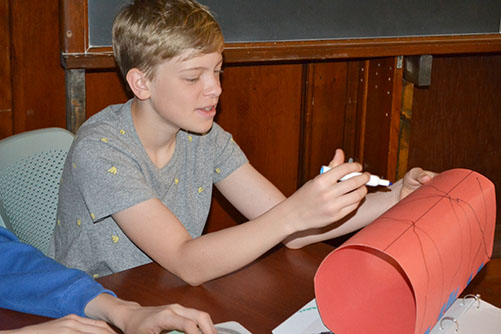
Samuel Balogh plays tic-tac-toe on a cylinder during the surfaces class.
Samuel Balogh, a rising freshman at Central High, shares why he came to SIM: “I didn't have much to do over the summer, and I thought this could be a fun experience, so I signed up.” He says not only has camp been fun, but he’s learned lots of different cool things. In fact, he was surprised to discover that certain things were math, such as game theory stuff, like tic-tac-toe and cryptography.
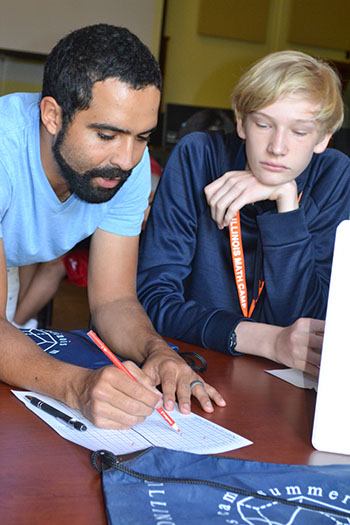
Fernando Roman Garcia (left) explains to Nicholas Bodony how battleship works on a cylinder.
Nicholas Bodony, a rising freshman at University Laboratory High School, indicates that although his favorite subject is probably math, he came to SIM camp for something different than one gets in school. “I thought it'd be interesting, because some of the math you do in school isn't that interesting…It seemed like a non-traditional math that would be fun to do.” Indicating that the camp had lived up to its billing, his favorite activity was probably the game theory activities and strategies. Regarding what he might be able to use at school, he indicates “The mod stuff, that was pretty interesting and seemed useful. Like Samuel said, the cryptography was interesting.”
Maggi Booth-Hodges, a rising eighth grader at Urbana Middle School, signed up for SIM camp because a teacher told her to.
“Because at my school, I'm ahead of everyone in math, and it's pretty boring. So they were like, ‘You should get to do more exciting stuff where you're not just sitting in class where you know everything already.’”
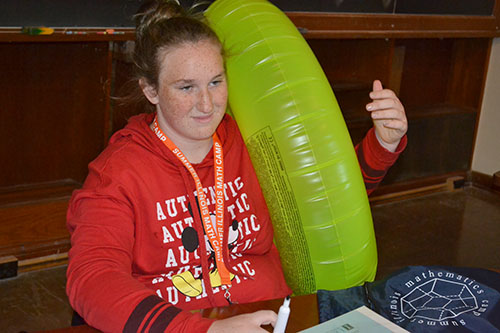
Maggie Booth-Hodges plays with a Torus.
Had it been fun and exciting? Different? Booth-Hodges says yes. Her favorite activity was tic-tac-toe on different topologies, adding, “One of the best parts about [camp] was getting to meet new people, you know?” Regarding whether math is in her future, she says, “Sorta.” She wants to be a marine biologist, addressing marine pollution and endangered species.
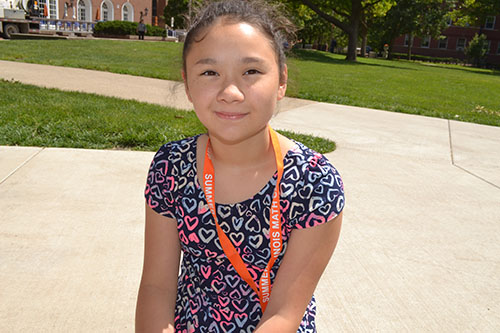
Stepheny Ek.
Stepheny Ek, a rising seventh grader, came to the camp because she’d heard of it before. “My brother went to the camp when he was a sixth or seventh grader, and then I decided I wanted to do it too. It's really fun,” she says. While math isn’t her favorite subject, she guesses she likes it. One of her favorite activities was learning how to do modular arithmetic, and she believes she’ll be able to use the proofs and the theorems in school.
Based on students’ comments and engagement during the activities, they had a really good time. And like the participants, the instructors were also hopeful that they’re going to be able to put some of the math they'd learned to good use in the future. Roman Garcia hopes they can:
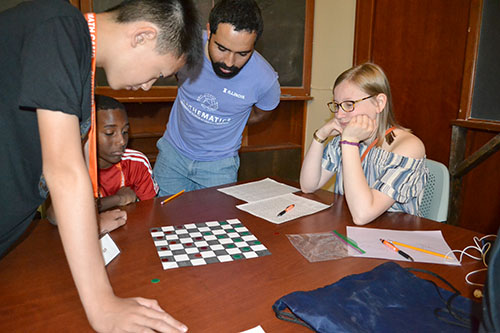
On the final day of camp, campers were allowed to pick whichever games they wanted to play on various sufaces. Here, they're playing checkers on a "cylinder" topology.
“The thing about mathematics that I think is more important than the results that you're learning is the methods and how you learn. And the logical and critical thinking that it takes to explain some mathematical equation is something that has a lot of applications to everyday life, to science, and to other areas of study.”
Story and photographs by Elizabeth Innes, Communications Specialist, I-STEM Education Initiative.
More: 6-8 Outreach, 8-12 Outreach, Mathematics, Summer Camps, 2019
For additional Math articles, see:
- IGL Links Central High Students to the More Knotty Aspects of Mathematic
- Illinois Geometry Lab: Changing the Shape of Math Research...and Outreach
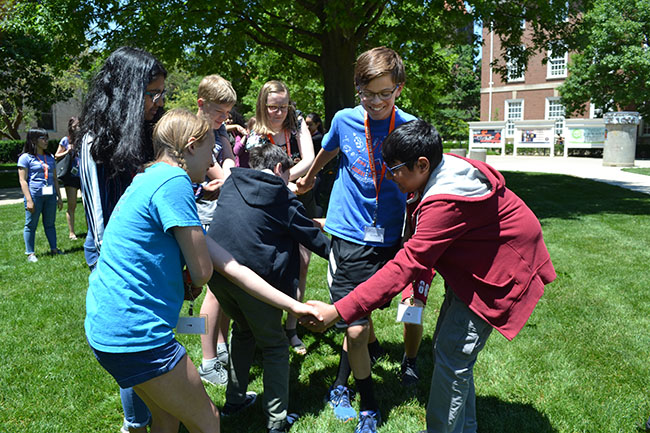
SIM camp students participate in the Human Knot activity.













.jpg)
















